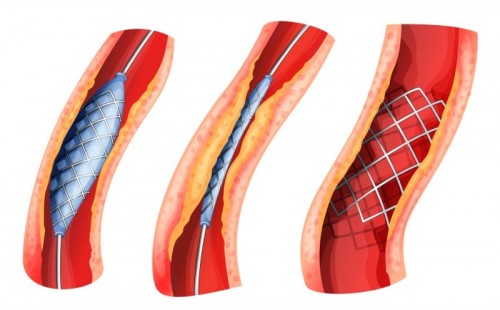The Abbott company received permission from the Ministry of Health to market biodegradable stents to hospitals, which will replace the permanent stents that are implanted in approximately 50 people a year who undergo catheterization

The pharmaceutical company Abbott announced the entry into Israel of its biodegradable stent, called Absorb.
Absorb makes it possible to replace the metal stents that have been used so far with catheters. In Israel there are about 50,000 catheters per year and the meaning of the new development approved by the Ministry of Health and put into use by hospitals is quality of life for the patient; Until now, the result of a stent remaining in the body has often been severe chest pains simulating a heart attack (angina), the need for repeated hospitalizations and repeated invasive treatments, great suffering for the patient and high costs for the health care system.
According to Abbott, in a press release, Absorb works by restoring blood flow in the heart similar to a metal stent, but it dissolves inside the body over time, leaving behind a more flexible blood vessel, which is able to continue more natural function and movement because it is free from the permanent metal stent. Absorb is made from a material called polylactide, a naturally soluble material, which is commonly used in medical implants such as dissolvable sutures. The device is called a scaffold to emphasize that it is a temporary structure, in contrast to the metal stent, which is a permanent implant.
The support, which begins to dissolve after 3-6 months, allows the artery to heal itself, and due to its flexibility, it allows the blood vessels to expand and contract as needed, in order to increase blood flow in the heart in response to normal activities such as exercise. Also, there is an expansion of possibilities in treatment and diagnosis, which leads to a reduction in costs; Reducing the need for long-term treatment with anticoagulants and freeing future interventions from the disturbances of a permanent implant, such as repeated hospitalizations resulting from the need for repeated invasive interventions.
The biodegradable support has undergone extensive research over the past 5 years among more than 10,000 patients worldwide and is used in 60 countries, including all European countries, Australia, Latin America and more, and is considered a groundbreaking and revolutionary in the field of stents that has remained unchanged since they were put into use about - 25 years.
Abbott's Absorb releases the drug everolimus, a drug that inhibits cell proliferation that is used in Abbott's dedicated heart stent systems called XIENCE. The drug everolimus was developed by Novartis Pharma AG and has been shown to inhibit unwanted cell growth inside the stent, thanks to its anti-proliferative properties.
Prof. Ran Koronovski, director of the cardiology unit at Rabin Medical Center: "Absorb presents a truly revolutionary innovation, which opens up a new era for us in the field of treating patients suffering from coronary artery disease. Cardiologists and patients are excited about the availability of Absorb in Israel because it is one of the most advanced technologies in the world in the treatment of blockages in the arteries of the heart."
John M. Kapec, senior vice president of Abbott's global medical devices division: "We are proud to be the first company to bring to market an expendable drug release support, which has the potential to revolutionize the way physicians treat their patients with coronary artery disease."
Abbott is not the only company in the field, even if it was several months ahead. Added to which the companies have also developed and market biodegradable stents Elixir and Boston Scientific. Experimental use of biodegradable stents has already been done in Israel since the beginning of 2014. See a video
On the same topic on the science website
Strengthen and disappear - on biodegradable stents / Ethan Crane

2 תגובות
The soluble proppant is not
Allows the artery to heal /, is not flexible and does not allow the blood vessels to expand and contract as needed, to increase blood flow in the heart in response to normal activities such as exercise. It is not known whether the following support increases or decreases costs; It certainly does not reduce the need for long-term treatment with antiplatelet drugs and it is not at all clear whether it will reduce future interventions compared to a stent - a permanent implant. It is clear that the author of the article does not understand right and left, and is misleading the general public with unfounded nonsense.
Yes